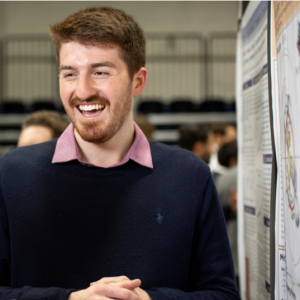Student spotlight
Kyle Ghaby
Major: Chemistry and Biomedical Sciences Mentor: Gerrick Lindberg and Matthew SalangaKyle Ghaby Video
Supercomputers, zebra fish, and insulin: undergraduate researcher combines physics and biology
 Kyle Ghaby and a supercomputer named Monsoon play with possibilities that could result in very real benefits for millions of diabetics and prediabetics.
Kyle Ghaby and a supercomputer named Monsoon play with possibilities that could result in very real benefits for millions of diabetics and prediabetics.
Ghaby, a chemistry and biomedical sciences double major from Los Angeles, works in applied physics and materials science assistant professor Gerrick Lindberg’s computational chemistry lab on a project investigating new ways to make insulin, a medication used to treat diabetes, temperature-resistant.
Insulin is normally stored in a water-based solution that, once opened, depends on refrigeration to remain effective. For patients that don’t have reliable electricity, either because they live in areas that are remote, impoverished or have been hit by storms, their insulin supply is at risk—potentially endangering their lives.
To solve this problem, the research team is working to determine whether an ionic insulin solution holds promise, since liquid salt is more stable than water. Ghaby uses Monsoon, NAU’s high-performance computing cluster, to perform calculations related to the physical chemistry involved in formulating the solution.
“These metrics are extremely difficult to gather experimentally,” Ghaby said. “So I use Monsoon to calculate physics-based simulations to predict how these molecules would react together in real life.”
Turning passion into practice through research at NAU
As an undergraduate, Ghaby is realizing his scientific aspirations by gaining valuable theoretical knowledge in Lindberg’s lab. He’s also developing experimental insights by studying the diet of zebra fish in biological sciences assistant professor Matthew Salanga’s lab. The support of his faculty mentors has shaped Ghaby’s approach to obstacles in his work.
“They both let me troubleshoot on my own before helping, and consider my ideas before pitching their own,” Ghaby said. “I learn more effectively if I can process it myself. When I am having a hard time comprehending something, this scientific agility in which they navigate their research has really inspired me to be like them.”
Ghaby developed a love of science in high school, and has seized the opportunity to turn his passion into practice at NAU. He finds that scientific research is a “humbling” experience.
“When you learn about life on this scale, there’s almost a philosophical aspect that really changes your perspective on life and the world,” he said. “I really enjoy it. It lets you step back from these daily problems. I’m in awe of what our bodies can do and what this universe is made of.”